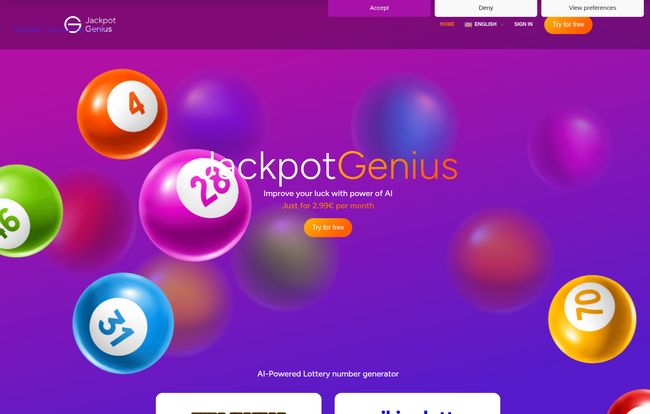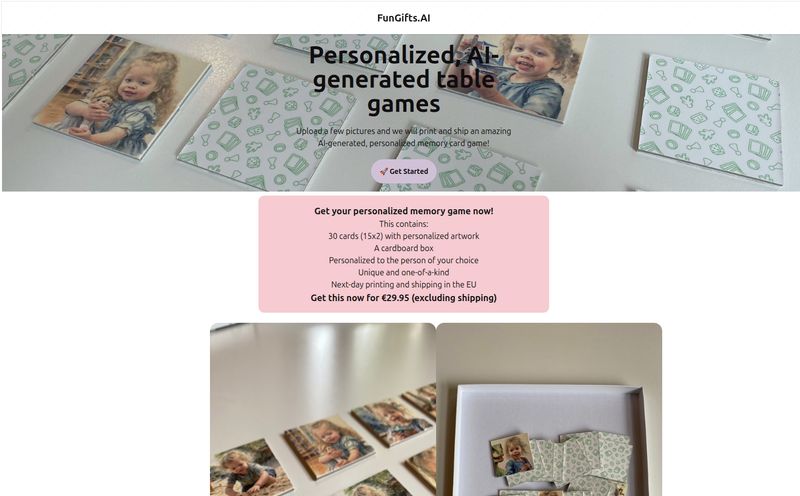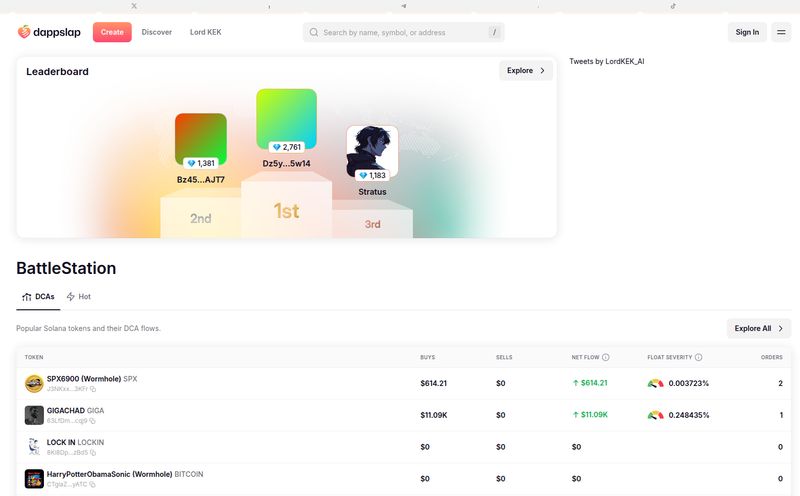Alright, let’s have a real chat. Every time a big lottery jackpot rolls around, we all have the same conversation, don't we? “If I won, I’d…” followed by dreams of quitting our jobs, buying a private island, or just finally paying off our student loans. Most of us grab a ticket using the same old methods: birthdays, anniversary dates, or the classic ‘let the machine decide’ quick pick. It’s a game of pure, unadulterated luck. Or is it?
I've been in the SEO and data trends game for years, and I've seen AI work its way into everything from writing articles to predicting stock market shifts. So when I stumbled upon a tool called Jackpot Genius, which claims to use AI to predict lottery numbers, my professional curiosity went into overdrive. An AI that improves your luck? It sounds like something straight out of a sci-fi movie. But I had to see what it was all about.
So What Exactly Is Jackpot Genius?
At its core, Jackpot Genius is an AI-powered lottery number generator. Simple enough. But instead of just spitting out random digits like a typical quick pick machine, it does something far more interesting. It crunches the numbers. We’re talking years and years of historical data from some of the world's biggest lotteries. The platform’s AI sifts through this mountain of information, looking for patterns, trends, and number frequencies that a human brain could never hope to spot. It’s trying to bring a little bit of data science to a field dominated by chance.
Think of it less as a psychic and more as a super-intelligent lottery historian that’s constantly learning and adapting with every new draw.

Visit Jackpot Genius
How This AI Magic Actually Works Under the Hood
You’re probably thinking what I was thinking: “Sure, but how?” The site mentions it uses sophisticated algorithms, and for us tech folks, they even drop names like Python and ChatGPT-4, which tells me there’s some serious processing power at play here. The concept is pretty brilliant, in a way. It’s like being a card counter at a casino, but for multi-million-dollar jackpots.
The AI doesn’t just look at which numbers have won before. It analyzes the when, the how often, and the relationships between the numbers drawn over time. It’s looking for statistical anomalies—numbers that are 'hot' (appearing frequently) or 'cold' (overdue for an appearance). This is a far cry from just picking your kid’s birthday. It’s a calculated approach based on historical performance. A numbers game, literaly.
Covering the Big Guns: From Powerball to Eurojackpot
One of the first things I checked was which lotteries they actually cover. I was pleasantly surprised. It’s not just some obscure, local draw. They have the heavy hitters on their roster. We're talking about massive international games like Eurojackpot, Powerball, Euromillions, and Vikinglotto, along with several other significant national lotteries. The homepage shows they have historical data going back over a decade for most of them—some even up to 24+ years! That’s a ton of data for the AI to chew on, which is exactly what you want to see.
Okay, Let's Be Real: Can You Actually Beat the Lottery with AI?
This is the big question, isn’t it? Can a piece of software guarantee you a win? Let's pump the brakes for a second. The short answer is no, and Jackpot Genius is upfront about this. Anyone promising a guaranteed lottery win is selling snake oil. But that's not what this is.
The Data-Driven Dream
The real advantage here is about shifting the odds, even if it’s just a tiny bit, in your favor. Instead of pure, blind luck, you're making an educated guess. The AI provides insights based on hard data. It’s about playing smarter. If a certain number hasn't appeared in five years, while others pop up every few months, isn't that information you'd want to have? I've always felt that having more data is better than having none, and that's the core appeal here.
A Dose of Cold, Hard Reality
Now for the reality check. A lottery draw is, by design, a random event. Past performance is not a perfect indicator of future results. The AI's effectiveness is entirely dependent on the idea that there are subtle, underlying patterns in what we perceive as total randomness. Some mathematicians would argue that each draw is a completely independent event, making historical data irrelevant. So, you have to go in with your eyes open. This tool is an edge, not a magic wand. It can’t account for a completely random, once-in-a-lifetime number combination that defies all historical trends.
The Million-Dollar Question… or the €2.99 Question
So, what does access to this AI brain cost? According to their site, it’s €2.99 per month. My first reaction? That's… surprisingly reasonable. I spend more than that on a single cup of coffee without a second thought. For less than the price of a fancy latte, you get a tool that might, just might, give you a better shot at winning millions. When you think about how much people spend on lottery tickets each month, adding a few euros for a strategic tool doesn't seem so crazy.
For me, the value isn't just in the potential win. It's also in the fun of it. It adds a new layer of engagement to playing teh lottery. Instead of just hoping, you're strategizing. And for €2.99, that's pretty cheap entertainment.
My Final Take on Jackpot Genius
So, where do I land on Jackpot Genius? I’m a data guy, but I'm also a realist. I'm not going to tell you to mortgage your house to buy lottery tickets with AI-generated numbers. But I am going to say that this is a fascinating and genuinely innovative tool. It takes the idle daydream of winning the lottery and injects a dose of modern technology and strategy into it.
If you're someone who enjoys playing the lottery regularly, Jackpot Genius offers a compelling way to mix up your strategy for a very low cost. It’s a fun, data-driven experiment. Will it make you a millionaire overnight? Probably not. But could it turn your game of pure chance into a game of slightly-better-than-chance? In my experience, that’s an edge worth exploring.
Frequently Asked Questions
Is Jackpot Genius legitimate or a scam?
From my analysis, Jackpot Genius appears to be a legitimate tool. It doesn't promise guaranteed wins, which is a good sign. It's transparent about its methodology—using AI and historical data to generate numbers. It’s a prediction tool, not a get-rich-quick scheme.
What lotteries can I get AI predictions for?
Jackpot Genius supports a wide range of popular international and national lotteries, including Powerball, Eurojackpot, Euromillions, Vikinglotto, SuperEnalotto, La Primitiva, and more. The full list is available on their website.
How much does Jackpot Genius cost?
The platform operates on a subscription model, which costs €2.99 per month. This gives you ongoing access to their AI-powered number predictions for all supported lotteries.
So, this will definitely make me win the lottery?
No, and it's important to be clear about this. No tool can guarantee a lottery win due to the random nature of the draws. Jackpot Genius is designed to increase your chances by using a data-based strategy, not to guarantee a victory.
How is this different from a normal Quick Pick or Random Number Generator?
A Quick Pick or standard random number generator gives you completely random numbers with no underlying logic. Jackpot Genius is the opposite; its number suggestions are based on a deep analysis of years of historical lottery data, looking for patterns and statistical likelihoods to give you a more strategic set of numbers.
Conclusion
In a world increasingly driven by data, it was only a matter of time before AI took a shot at the lottery. Jackpot Genius is a cool blend of old-fashioned hope and new-age technology. It won’t break the laws of probability for you, but it offers a genuinely smart and affordable way to approach the game. For the price of a coffee, you get to feel less like a gambler and more like a strategist. And who knows? Maybe that little data-driven edge is all you need for your numbers to finally come up.
Reference and Sources
- Jackpot Genius Official Website
- A Simple Way to Start Making Decisions with AI - Harvard Business Review



